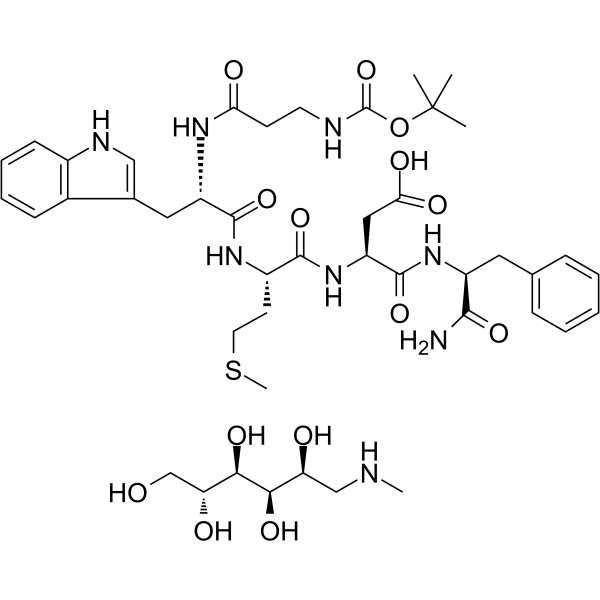Pentagastrin meglumine
Modify Date: 2024-04-08 20:08:36

Pentagastrin meglumine structure
|
Common Name | Pentagastrin meglumine | ||
|---|---|---|---|---|
| CAS Number | 57448-84-7 | Molecular Weight | 963.11 | |
| Density | N/A | Boiling Point | N/A | |
| Molecular Formula | C44H66N8O14S | Melting Point | N/A | |
| MSDS | N/A | Flash Point | N/A | |
Use of Pentagastrin megluminePentagastrin (ICI-50123) meglumine is a potent, selective Cholecystokinin B (CCKB) receptor antagonists with IC50 values of 11 nM and 1100 nM for CCKB and CCKA, respectively. Pentagastrin meglumine enhances gastric mucosal defense mechanisms against acid and protects the gastric mucosa from experimental injury[1].[2]. |
| Name | Pentagastrin meglumine |
|---|
| Description | Pentagastrin (ICI-50123) meglumine is a potent, selective Cholecystokinin B (CCKB) receptor antagonists with IC50 values of 11 nM and 1100 nM for CCKB and CCKA, respectively. Pentagastrin meglumine enhances gastric mucosal defense mechanisms against acid and protects the gastric mucosa from experimental injury[1].[2]. |
|---|---|
| Related Catalog | |
| In Vitro | Pentagastrin (ICI-50123) meglumine (0.1-100 μM; GH3-cells) increases intracellular Ca2+ in a dose-dependent manner with a maximal increase of 2.77-fold[1]. Pentagastrin (ICI-50123) meglumine (0.1-100 μM; GH3-cells) bounds dose dependently to GH3 cells[1]. |
| In Vivo | Pentagastrin (ICI-50123) meglumine (80 µg/kg/h; i.v.; male Sprague-Dawley rats) protects rat gastric mucosa from acidified aspirin injury[2]. Animal Model: Male Sprague-Dawley rats[2] Dosage: 80 µg/kg/h Administration: Intravenous injection Result: Protected rat gastric mucosa from acidified aspirin injury. Induced a hyperaemic response to luminal acid challenge, increased mucus gel thickness, and elevated pHi during acid challenge. |
| References |
| Molecular Formula | C44H66N8O14S |
|---|---|
| Molecular Weight | 963.11 |